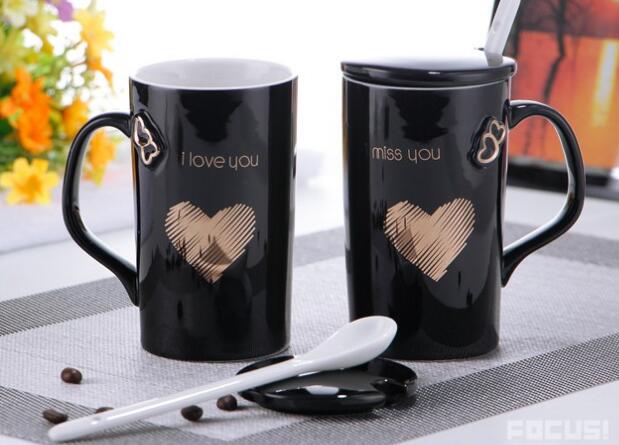From
Ceramic Mug Group, The so-called toxic ceramic mugs is because the
custom coffee mugs in printing patterns due to not following the standard operation methods and processing procedures may lead to the ceramic mug lead and cadmium and other heavy metal content exceeding the standard.
Generally, high heavy metal content is printed on the mug of the gold color agent, such as the mug may have gold edge. These gold or gold patterns are all made of pure gold, printed in floral paper, and then made by baking flowers. The golden pattern should be baked at a higher temperature when baking flowers. In order to save the gas cost, many enterprises can not reach the standard temperature of the golden water color agent when baking flowers, which may make the product heavy metal exceed the standard.

The simplest way to detect whether the
ceramic mug suppliers has exceeded the standard of heavy metals is to heat the ceramic mugs with lid in the microwave oven. If the pattern above changes color after taking it out, it indicates that the product has excessive heavy metal.
However, it should be noted that the ceramic mugs with excessive heavy metals will not cause cancer. But we hope that when you buy ceramic products, you can buy them in regular shops, not in roadside stalls and other small shops. Because most of the products coming in from small shops are the tail goods after the factory's delivery or the products with quality problems, such products may have excessive heavy metals.
Of course, we also call on our colleagues to follow strict standards and processes in any link. Even if our products are processed products, there will be no problem of excessive heavy metals, at least in our factory.
Custom personalised mugs are seeing the value of quality and flavor when it comes to choosing brands.
Foodservice branded coffees such as Starbucks, Caribou, and Peet's are particularly popular as Americans turn their kitchens into coffee shops.
Gen Z consumers are leading the way in the at-home craze, with 46% drinking ready-to-drink coffees, but only 45% of Gen Z consumers drink ground coffee compared to 63% of Millennials.
Gen Zs have not yet adopted regular brewed coffee nor have they developed their preferred coffee brands. Only 33% say they typically stick to the same brand of coffee, compared to 44% of Gen X and 50% of Baby Boomers. This gives coffee brands the opportunity to build long-lasting loyalty among Gen Z.
Flavored coffee varieties can be used to appeal to the group as 42% of Gen Z are interested in unique flavors of coffee.
Gen Zs in particular are set to adopt the trend for enjoying specialty coffee at home. Before COVID-19, many Gen Z consumers bought their coffees out, treating themselves to cold coffees from their preferred coffee chain," said Bryant. But with these younger consumers experiencing the sharpest rise in unemployment and already on lower incomes, they are the most price-sensitive to coffee drinks.
Bryant noted Gen Z is likely to reduce their coffee shop purchases, possibly dramatically, depending on the severity of the recession. This gives retail brands an opportunity to connect with the generation.